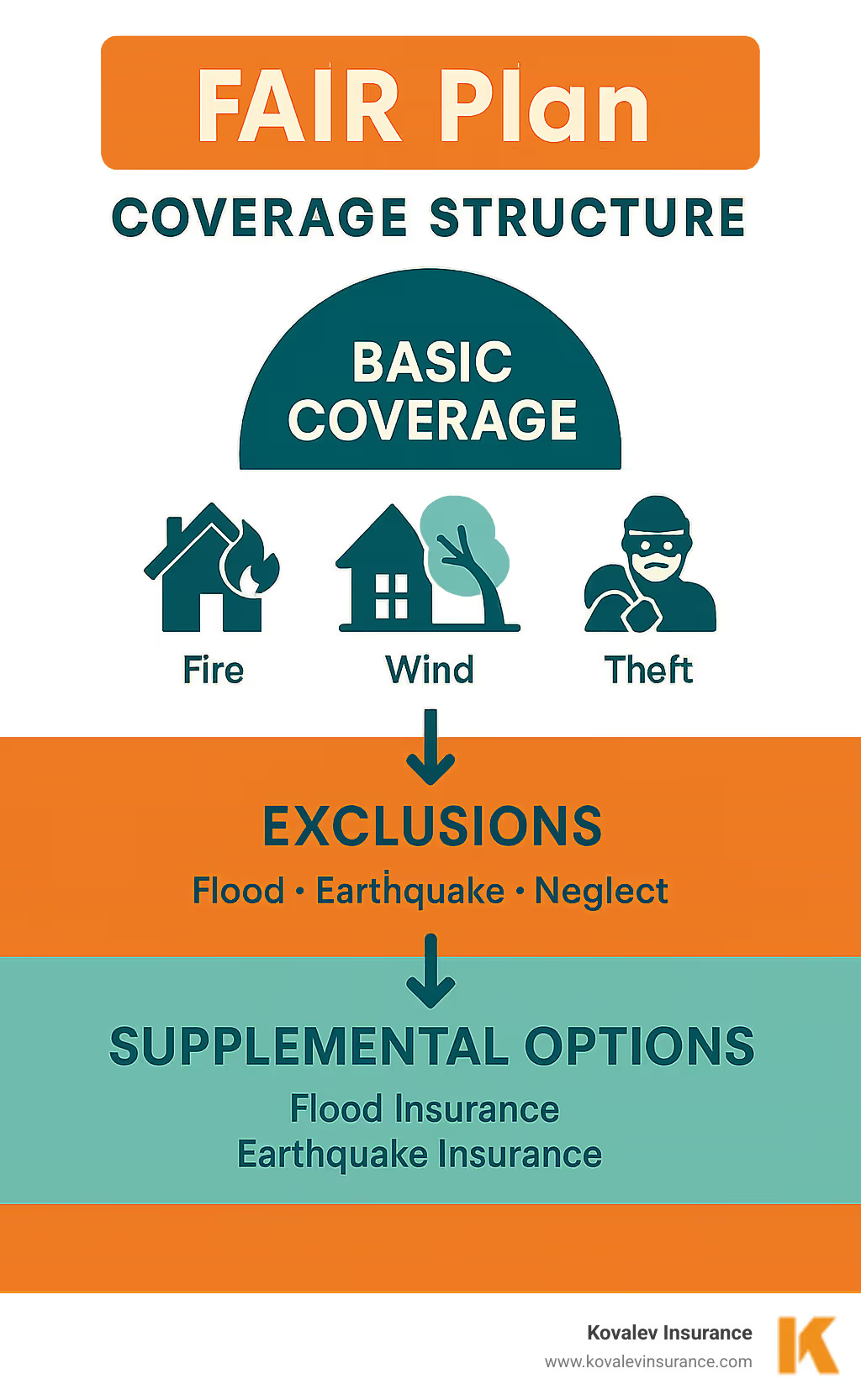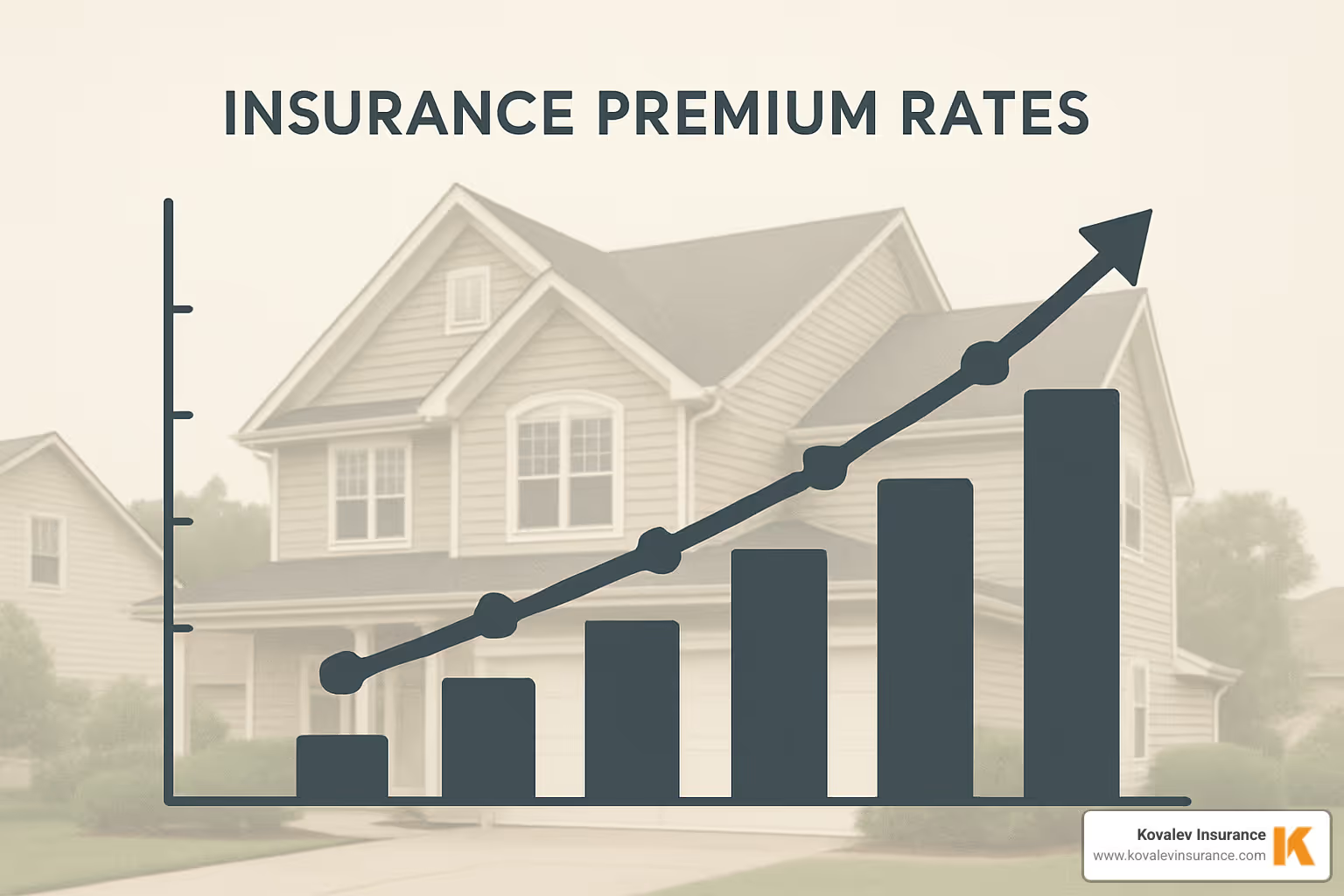Blog Content
2
Sep
2025

A fair plan is a state-mandated insurance program that provides basic property coverage to homeowners who cannot obtain insurance through the standard market. If you're searching for information about FAIR Plans, here's what you need to know:
When storms rage through Newton or wildfires threaten homes in California, insurance companies sometimes retreat from high-risk areas. That's when the fair plan becomes a crucial safety net for property owners.
The Massachusetts FAIR Plan, officially known as the Massachusetts Property Insurance Underwriting Association (MPIUA), serves as the Commonwealth's insurer of last resort. For homeowners in communities like Wellesley, Brookline, Needham, Belmont, and Natick who have been denied coverage by traditional insurers, the FAIR Plan provides essential protection against potential catastrophic losses.
Unlike standard homeowners insurance, fair plan policies often come with higher premiums and more limited coverage. However, they fulfill a critical need by ensuring that all property owners have access to basic insurance protection, regardless of their home's location or risk factors.
As the owner of Kovalev Insurance Agency serving Massachusetts homeowners since 2015, I've helped hundreds of clients steer the complexities of fair plan coverage when standard options weren't available. My agency has extensive experience guiding property owners through the FAIR Plan application process and identifying supplemental policies to fill coverage gaps.

Related content about fair plan:
When storms batter our Massachusetts coastline or when a home's age makes standard insurers nervous, the FAIR Plan steps in as a crucial safety net. Born from the Urban Property Insurance Protection and Reinsurance Act of 1968, this program emerged during a time when insurance redlining left many urban homeowners without options.
Here in Massachusetts, our FAIR Plan is managed by the Massachusetts Property Insurance Underwriting Association (MPIUA). Since its early days, it has evolved to serve homeowners throughout the Commonwealth—from the historic homes of Newton to the beautiful properties in Wellesley, Brookline, Needham, Belmont, and Natick.
Think of the FAIR Plan as the insurance market's safety valve. When standard carriers say "no" due to a home's coastal location, age, or other risk factors, the FAIR Plan ensures Massachusetts residents still have access to basic property protection. This is especially important in our state, where colonial-era homes, coastal exposure, and those notorious New England winters create unique insurance challenges.
The FAIR Plan (Fair Access to Insurance Requirements) is essentially a cooperative effort among all property insurers in Massachusetts. It's not a government agency or taxpayer-funded program—it's actually a private association where insurance companies share responsibility for covering high-risk properties.
Here's what makes our Massachusetts FAIR Plan work:
Every insurer writing residential property policies in Massachusetts must participate—it's not optional. This creates a risk-pooling system where companies share in both profits and losses based on their market share. When a major storm hits Cape Cod or a series of winter claims pile up, no single company bears the full financial burden.
Unlike the "all-risk" coverage you might get from a standard policy, FAIR Plan policies operate on a "named perils" basis. This means they specifically list what's covered—typically fire, lightning, explosion, and windstorm damage—rather than covering everything except what's excluded.
The Massachusetts Division of Insurance provides oversight to ensure the plan fulfills its mission of being the state's residual market—the place where homeowners can turn when all other options have closed their doors.
Not everyone can simply choose the FAIR Plan—it truly is designed as a last resort. To qualify in Massachusetts, you'll need to demonstrate that you've been turned down by at least two standard insurance companies. This requirement ensures the FAIR Plan serves those who genuinely need it without competing with the standard market.
Your property also needs to meet basic safety standards. Homes with significant hazards or code violations typically won't qualify until those issues are addressed. The MPIUA's inspection bureau will likely examine your property to verify eligibility and determine appropriate rates.
What makes a property "high-risk" in the eyes of standard insurers? Several factors can come into play:
Your beautiful beachfront cottage in Wellfleet might be declined due to coastal storm exposure. That charming 1880s Victorian in Newton might raise concerns about outdated electrical systems. A neighborhood with higher crime statistics might trigger denials. Or perhaps you've had multiple claims in recent years that make standard insurers nervous.
For homeowners in Newton, Wellesley, and surrounding communities, working with a knowledgeable local agent can make navigating the FAIR Plan application process much smoother. At Kovalev Insurance, we've guided countless Massachusetts homeowners through the process of documenting denials, preparing for inspections, and understanding what to expect from FAIR Plan coverage.
The FAIR Plan exists to ensure that every Massachusetts homeowner has access to basic property insurance protection—regardless of their home's age, location, or unique risk factors. It's an essential part of our state's insurance safety net, especially as climate-related risks continue to reshape the insurance landscape.

When standard insurers turn you away, the Massachusetts FAIR Plan becomes your safety net—but it's important to understand what you're getting and what you might be missing. Think of it as basic protection rather than the comprehensive coverage you'd typically find in the standard market.
Here in Massachusetts, particularly in communities like Newton and Wellesley, homeowners sometimes find the limitations of FAIR Plan coverage only after filing a claim. At Kovalev Insurance, we believe in transparency about both the protections and the gaps.
The Massachusetts FAIR Plan offers several policy types that mirror standard homeowners policies (HO-1, HO-2, HO-3, etc.), but with a more limited scope. It's like getting the basic cable package when you're used to premium channels—it works, but you'll notice what's missing.
The FAIR Plan in Massachusetts isn't completely bare-bones. It does cover several important perils that could damage your Brookline or Natick home.
Your policy typically protects against fire and lightning, which are foundational coverages for any homeowner. Those powerful wind and hail storms that occasionally sweep through Needham and Belmont? You're generally covered there too, though coastal properties might face higher deductibles for these perils.
If an explosion rocks your neighborhood or smoke damage affects your home, the FAIR Plan has you covered. Coming home to find your property vandalized or belongings stolen? The plan includes protection against theft and vandalism as well.
Even unusual scenarios like damage from vehicles or aircraft (yes, it happens!) fall under the protection umbrella of the Massachusetts FAIR Plan.
When selecting your policy, you'll have choices about deductibles—typically from 1% to 5% of your home's insured value. Like most insurance decisions, it's a balancing act: higher deductibles mean lower premiums but more out-of-pocket costs when filing a claim.
The plan also extends coverage to those additional structures on your property—the garage where you store your snowblower, the shed housing your gardening tools, or the fence that keeps your Belmont yard private. This coverage typically amounts to about 10% of your dwelling coverage.
Want a deeper dive into what Massachusetts home insurance typically covers? Check out our detailed guide on MA home insurance coverage.
The FAIR Plan has some significant gaps compared to standard policies that Newton and Wellesley homeowners should be aware of. Think of these as the fine print that matters most when disaster strikes.
Perhaps the most significant limitation is the actual cash value (ACV) settlement method used by many FAIR Plan policies. Unlike replacement cost coverage, ACV factors in depreciation when calculating claim payments. This means your 15-year-old roof that's damaged in a storm might only be valued at a fraction of what a new roof would cost today. For many Brookline and Needham homeowners, this creates a serious financial gap when rebuilding.
When a pipe bursts and your Natick home becomes temporarily uninhabitable, standard policies typically cover your hotel stays and increased food costs. Many FAIR Plan policies, however, provide limited or no loss of use coverage, potentially leaving you to shoulder these unexpected expenses yourself.
The liability gap is another concern. If a delivery person slips on your icy Belmont driveway or your child accidentally damages a neighbor's property, standard policies offer protection. FAIR Plan policies often limit or completely exclude this vital personal liability coverage.
Water damage limitations are also more restrictive than in standard policies, with many types of water-related incidents falling outside the coverage boundaries.
Fortunately, you don't have to live with these gaps. We often recommend these supplemental options to our Massachusetts clients:
Difference in Conditions (DIC) policies work alongside your FAIR Plan coverage to fill specific gaps, providing a more comprehensive safety net. For coastal homes or properties near waterways, separate flood insurance through the National Flood Insurance Program or private insurers is essential, as FAIR Plan policies never cover flood damage.
Concerned about earthquakes? While rare in Massachusetts, they do happen. An earthquake endorsement can sometimes be added to your FAIR Plan policy, typically with a higher deductible. And to address the liability gap, a separate umbrella liability policy provides additional protection and peace of mind.
At Kovalev Insurance, we don't just sell you a policy and disappear. We carefully analyze each client's unique situation—whether you're in Newton, Wellesley, or anywhere in the greater Boston area—to identify these potential coverage gaps and recommend appropriate supplemental policies. Our goal is ensuring you have comprehensive protection, even when the standard market won't provide it.

When Massachusetts homeowners come to us at Kovalev Insurance asking about fair plan costs, I always start with the honest truth: you'll typically pay more for less coverage. That's the reality of fair plan policies – they're designed for higher-risk situations that standard insurers have walked away from.
Here in Massachusetts, fair plan premiums typically run about 15-30% higher than what you'd pay for similar coverage in the standard market. But I've seen cases across Newton, Wellesley, and other Greater Boston communities where the difference can be even more significant depending on specific property factors.
Think of the fair plan as the insurance world's safety net – it's not designed to be the most affordable option, but rather the option that's there when nothing else is. The pricing reflects this reality.
Your fair plan premium isn't pulled from thin air – it's calculated using several key factors that the Massachusetts Division of Insurance reviews and approves. When I'm explaining this to clients in Brookline or Needham, I break it down into these main elements:
Home value and construction type make a huge difference. Brick homes in Belmont typically receive better rates than wooden structures because they're more fire-resistant. This makes perfect sense from a risk perspective.
Location matters enormously. A home in coastal Massachusetts faces different risks than one in Natick. Properties near the coast often face higher premiums due to increased exposure to storms and flooding.
Your claims history follows you. If you've filed multiple claims in recent years, expect to pay more. The fair plan also considers the overall claims history for your neighborhood or region.
Deductible choices give you some control over your premium. Many of my clients in Wellesley opt for higher deductibles to keep their premiums manageable, though this means more out-of-pocket costs if disaster strikes.
Credit-based insurance scores can impact rates in many states, though Massachusetts has stricter regulations around this practice than many other states.
Safety features like smoke detectors, security systems, and fire extinguishers can sometimes earn you discounts, though these tend to be more modest with fair plan policies than with standard insurance.
Unlike the competitive standard insurance market where companies try to undercut each other for your business, the fair plan exists in its own space. Its rates must be high enough to cover expected losses without competing with the standard market, yet not so high that homeowners can't afford protection.
One question my Massachusetts clients often ask: "What happens if a major disaster hits and the fair plan faces more claims than it can handle?" It's a fair concern, especially as we see more severe weather events.
The fair plan has multiple layers of financial protection:
First, your premium dollars form the foundation of the system. This is the primary funding source for claims in normal years.
Second, the plan purchases reinsurance – essentially insurance for insurance companies – to protect against large-scale losses.
If these resources are exhausted after a major event, member insurance companies get tapped next. Every insurer writing homeowners policies in Massachusetts must participate in the fair plan and may be assessed to cover deficits based on their market share. If a company writes 10% of Massachusetts homeowners policies, they're on the hook for 10% of any assessment.
After a particularly devastating event, policyholder surcharges might be implemented to rebuild reserves. This spreads the cost across all fair plan customers rather than just those who experienced losses.
In extreme scenarios, some states authorize their fair plans to issue bonds to pay claims, though this mechanism is rarely used.
Throughout this process, the Massachusetts Division of Insurance provides oversight to ensure the system remains solvent and fair.
While this layered approach has worked historically, climate change is putting new pressure on the system. The increasing frequency and severity of storms, wildfires, and other disasters raise questions about long-term sustainability if the FAIR plan faces overwhelming obligations.
At Kovalev Insurance, we keep a close eye on these developments to provide our Massachusetts clients with current, accurate information about their fair plan options and costs. While we always try to find standard market coverage first, we're experienced in navigating the fair plan when it's the best solution for your situation.

When standard insurers have closed their doors to you, the Massachusetts FAIR Plan becomes your safety net. Whether you own a historic Victorian in Newton, a coastal property in Wellesley, or a home anywhere else in the Greater Boston area, the path to securing this coverage follows a specific route—one we've guided hundreds of homeowners through at Kovalev Insurance.
Think of the FAIR Plan application as telling your home's story. It's not just about filling out forms; it's about documenting why you need this coverage and proving your property meets basic standards. While the process might seem daunting at first, breaking it down into manageable steps makes it much more approachable.
The FAIR Plan truly is the "last resort" market—you'll need to show you've been turned away elsewhere before they'll welcome you in. But don't worry, that's exactly where our expertise comes in handy for homeowners in communities like Brookline, Needham, Belmont, and Natick.
The journey to FAIR Plan coverage begins with documentation. You'll need written proof that at least two standard insurance companies have declined to cover your property. These declinations aren't just formalities—they're your ticket to eligibility.
Next comes the application itself, which requires a thorough accounting of your home's vital statistics. You'll need to document everything from construction materials to the age of your heating system. This is where attention to detail matters—mistakes or omissions can delay your coverage when you need it most.
Most properties require an inspection before the FAIR Plan will issue coverage. Think of this as your home's physical exam—the inspector will verify the information in your application and identify any issues that might need addressing. For homes in Newton and surrounding communities, these inspections often focus on older electrical systems, roof condition, and general maintenance.
Choosing your coverage limits and deductible requires careful consideration. While higher deductibles can lower your premium, they also mean more out-of-pocket expenses when claims occur. We help our clients find the right balance for their financial situation.
Once approved, you'll need to pay your premium to activate coverage. The entire process typically spans 2-4 weeks, though homes requiring repairs or updates may take longer. Throughout this journey, our team at Kovalev Insurance serves as your guide and advocate, handling much of the paperwork and communication on your behalf.
While the FAIR Plan provides essential protection, most homeowners prefer the broader coverage and potentially lower premiums available in the standard market. Fortunately, your time in the FAIR Plan doesn't have to be permanent.
Roof upgrades make a tremendous difference in your insurance prospects. Standard carriers often balk at roofs older than 10-15 years, especially in areas like Massachusetts where winter weather takes a heavy toll. Investing in a new roof not only protects your home but can be your ticket back to the standard insurance market.
Electrical system modernization addresses another major concern for insurers. Homes in historic communities like Wellesley or Brookline often retain charming period features, but knob-and-tube wiring and fuse boxes raise red flags for underwriters. Upgrading to circuit breakers and modern wiring significantly improves your insurability.
Water damage prevention measures like leak detection systems and sump pumps with battery backups demonstrate to insurers that you're proactively managing risk. Given that water damage claims are among the most common and costly, these improvements can make your home more attractive to standard carriers.
Maintaining a claim-free record for several years shows insurers you're a lower-risk customer. While you can't control events like severe storms, focusing on preventive maintenance helps avoid the types of claims that can keep you in the FAIR Plan longer.
The most important strategy is to regularly recheck the standard market. Insurance companies frequently adjust their underwriting guidelines, and improvements to your property may make you eligible for standard coverage. At Kovalev Insurance, we make it a practice to review options for our FAIR Plan clients annually, often finding pathways back to standard coverage that weren't available just months earlier.
For more detailed information about insurance options throughout Massachusetts, visit our comprehensive guide to Home Insurance Quotes Massachusetts.
The FAIR Plan is a lifeline when you need it, but with the right improvements and guidance, it doesn't have to be your permanent insurance solution. Our team specializes in helping homeowners in Newton, Wellesley, and throughout Greater Boston steer both the FAIR Plan process and the journey back to standard coverage when possible.
As storms intensify and weather patterns become more unpredictable, the relationship between FAIR Plans and risk reduction has never been more important. Here in Massachusetts, where coastal storms, harsh winters, and urban fire risks challenge homeowners year-round, taking steps to make your home more resilient isn't just smart—it might be the key to eventually getting back into the standard insurance market.
I've noticed a promising trend while helping clients throughout Newton, Wellesley, and surrounding communities: forward-thinking FAIR Plans are beginning to reward homeowners who take proactive steps to protect their properties. This approach benefits everyone—homeowners face fewer devastating losses, and the program itself becomes more sustainable long-term.

The Massachusetts FAIR Plan has begun exploring ways to encourage homeowners to strengthen their properties against disasters. If you're currently on a FAIR Plan policy, you should know about these potential benefits:
Premium discounts are becoming available for homes with specific resilience features. Installing impact-resistant roofing, adding storm shutters, or modernizing your electrical system could lower your premium while making your home safer. When I work with clients in coastal areas of Massachusetts, I often suggest prioritizing these improvements as they typically offer the best return on investment.
Resilience audits are another valuable tool. These professional assessments identify your property's specific vulnerabilities and recommend targeted improvements. For my clients in older homes throughout Brookline and Newton, these audits often reveal surprisingly affordable fixes that can significantly reduce risk.
Some homeowners may also qualify for home hardening grants, particularly those with lower incomes. These programs can help offset the costs of important safety improvements, making resilience more accessible to all Massachusetts residents.
One program I've been watching closely is the Fortified Roof program. While not yet widespread in Massachusetts, this initiative has shown impressive results in coastal states. Homes built to these standards have withstood hurricanes and severe storms with significantly less damage. As our climate continues to change, I wouldn't be surprised to see similar programs gain traction here, especially in vulnerable coastal communities like those on Cape Cod.
For my clients in Natick, Needham, and throughout Greater Boston, implementing these kinds of resilience measures often leads to multiple benefits: lower FAIR Plan premiums, better protection during disasters, improved chances of qualifying for standard insurance, and even improved property values in our increasingly risk-conscious real estate market.
As climate change intensifies, FAIR Plans nationwide are evolving to meet new challenges. Based on what I've seen working with insurance carriers across Massachusetts, several important trends are shaping the future:
Policy evolution is happening gradually, with FAIR Plans expanding their coverage options to better meet homeowner needs. While these improved policies typically come with higher premiums than standard market options, they're filling crucial gaps for homeowners in high-risk areas of Massachusetts.
Some states are testing comprehensive coverage pilots that more closely resemble standard homeowners insurance, including liability protection and additional living expenses coverage. These innovations could eventually benefit Massachusetts homeowners in places like Belmont and Wellesley who currently need to purchase separate policies to fill these gaps.
Legislative reforms are also on the horizon. As insurance availability challenges grow across Massachusetts and nationwide, state lawmakers are considering ways to strengthen FAIR Plans while ensuring they remain financially viable long-term.
Perhaps most importantly, new sustainable funding models are being explored to ensure these critical programs can withstand the increasing frequency and severity of climate-related disasters. This is particularly important in Massachusetts, where our exposure to nor'easters, winter storms, and coastal flooding creates unique challenges.
For my clients throughout Greater Boston, I emphasize that the future will likely include closer integration between insurance coverage, building codes, land-use planning, and hazard mitigation. Homeowners who take proactive steps now to implement resilience measures will be better positioned both for FAIR Plan coverage and an eventual return to the standard market.
At Kovalev Insurance, we stay current on these evolving programs so we can help our clients throughout Newton, Wellesley, Brookline, Needham, Belmont, and Natick identify the most cost-effective strategies for their specific properties and risk profiles. As Massachusetts weather becomes more unpredictable, making your home more resilient isn't just about insurance—it's about protecting your most valuable asset for the long term.
If you're shopping for homeowners insurance in Massachusetts and considering the FAIR Plan, one of your first questions is probably about cost. The truth is, you'll generally pay more for less coverage—typically 15-30% higher premiums than comparable standard market policies.
The price difference varies significantly depending on where your home is located. A well-maintained home in Newton or Wellesley might see a smaller premium jump than a beachfront property on Cape Cod, where wind exposure dramatically increases risk factors. Similarly, older homes in Brookline or Belmont with updated electrical systems face smaller surcharges than properties with original knob-and-tube wiring or outdated plumbing.
What makes this particularly challenging for homeowners is that while you're paying more, you're actually getting more limited protection. At Kovalev Insurance, we can provide specific premium comparisons custom to your property and coverage needs, helping you understand exactly what you're getting for your money.
Yes, you can remain on the Massachusetts FAIR Plan indefinitely. Unlike some states that force periodic reapplication to the standard market, Massachusetts allows continuous FAIR Plan coverage as long as you continue meeting eligibility requirements and paying your premiums.
That said, we generally recommend our clients check back with the standard market every year or so. Insurance companies frequently update their underwriting guidelines, and improvements you've made to your property might make you eligible for standard coverage that wasn't available before. Even changes in the insurance market itself might open new doors—a company that wouldn't touch your Newton home last year might be eager for your business this year.
Since standard market policies typically offer broader coverage at lower premiums, transitioning when possible usually makes good financial sense. At Kovalev Insurance, we regularly review our clients' situations to spot opportunities to move from the FAIR Plan to standard coverage that better protects their homes and wallets.
Yes, the Massachusetts FAIR Plan does provide wind and hail coverage for Cape Cod homes, though with some important caveats that coastal homeowners should understand.
First, expect higher wind deductibles. While your base deductible might be a straightforward $1,000, wind damage often comes with a percentage-based deductible—typically 1-5% of your dwelling coverage amount. On a $500,000 home, that means you could be responsible for the first $5,000-$25,000 of wind damage repairs.
Second, maximum coverage limits might be lower for coastal properties compared to similar homes further inland. This can create challenging gaps in protection for higher-value Cape properties.
Finally, homes in high-wind zones may need to meet specific construction standards or have wind mitigation features to qualify for coverage in the first place. Features like hurricane straps, impact-resistant windows, or reinforced garage doors might be required.
This wind coverage is particularly crucial on Cape Cod, where many private insurers have either dramatically restricted wind protection or withdrawn from the market entirely due to hurricane risk. The FAIR Plan has become a vital lifeline for coastal Massachusetts homeowners who would otherwise find themselves unable to secure this essential coverage.
For homeowners in Barnstable, Falmouth, or other Cape communities, we recommend scheduling a conversation with one of our insurance professionals who can provide guidance specific to your coastal property's unique situation and help you understand exactly what's covered—and what isn't—under a FAIR Plan policy.

When standard insurers say "no," the FAIR Plan says "yes." This vital safety net ensures Massachusetts homeowners aren't left vulnerable when traditional coverage options disappear. While it's true that FAIR Plan policies typically come with higher premiums and narrower coverage than what you'd find in the standard market, they provide essential protection when you need it most.
For our neighbors in Newton, Wellesley, Brookline, Needham, Belmont, Natick, and throughout Greater Boston, understanding both the strengths and limitations of the FAIR Plan is crucial. Think of it as your insurance lifeline – not your first choice, but absolutely invaluable when other doors have closed.
At Kovalev Insurance, we've guided hundreds of Massachusetts homeowners through insurance challenges since 2015. Our approach isn't one-size-fits-all – we recognize that your home, location, and circumstances create a unique insurance profile. Whether you're currently on the FAIR Plan or worried you might need it soon, we're here to help with personalized guidance.
We specialize in helping you determine whether standard market coverage is still an option (sometimes it is, even after a rejection or two!). If the FAIR Plan truly is your best path forward, we'll guide you through every step of the application process, recommend smart supplemental policies to fill coverage gaps, and suggest practical property improvements that might help you transition back to standard coverage down the road.
What sets us apart is our commitment to ongoing service. Insurance markets change, underwriting guidelines evolve, and your property situation shifts over time. We regularly review our clients' coverage to spot new opportunities as they emerge, rather than leaving you indefinitely on a higher-priced FAIR Plan policy when better options become available.
I'm Mikhail Kovalev, and my team and I understand that insurance isn't just about policies and premiums – it's about protecting your most valuable asset and giving you peace of mind. Whether you're struggling to find coverage for a coastal property, an older home, or a house with recent claims, we have the expertise to help you steer Massachusetts' complex insurance landscape.
Ready to explore your options? Wondering if you could qualify for better coverage than the FAIR Plan? Or need help understanding exactly what your current policy covers? Visit our Best Homeowners Insurance Massachusetts page or give us a call. We're real people, ready to have a real conversation about your insurance needs – no industry jargon, no pressure, just honest guidance from your neighbors in Greater Boston.
While the FAIR Plan provides essential protection when standard options aren't available, working with an experienced local insurance professional can help you steer its complexities and potentially find your way back to the standard market over time. That's exactly what we're here to help you do.
X